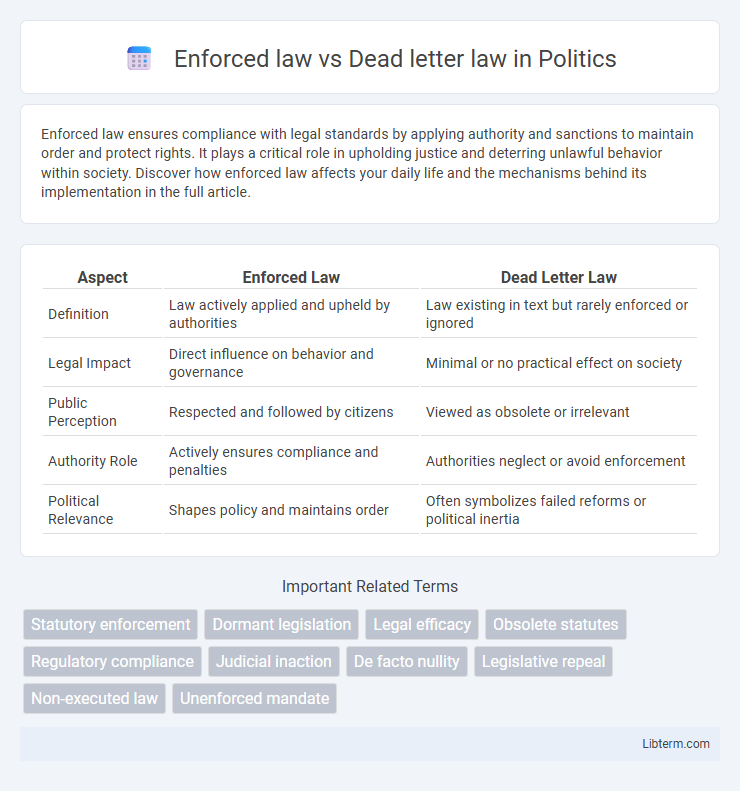Enforced law ensures compliance with legal standards by applying authority and sanctions to maintain order and protect rights. It plays a critical role in upholding justice and deterring unlawful behavior within society. Discover how enforced law affects your daily life and the mechanisms behind its implementation in the full article.
Table of Comparison
| Aspect | Enforced Law | Dead Letter Law |
|---|---|---|
| Definition | Law actively applied and upheld by authorities | Law existing in text but rarely enforced or ignored |
| Legal Impact | Direct influence on behavior and governance | Minimal or no practical effect on society |
| Public Perception | Respected and followed by citizens | Viewed as obsolete or irrelevant |
| Authority Role | Actively ensures compliance and penalties | Authorities neglect or avoid enforcement |
| Political Relevance | Shapes policy and maintains order | Often symbolizes failed reforms or political inertia |
Introduction to Enforced Law and Dead Letter Law
Enforced law refers to legal statutes actively upheld and implemented by authorities, ensuring compliance through penalties or sanctions. Dead letter law consists of statutes that remain officially valid but are no longer enforced or applied in practice, rendering them ineffective in shaping behavior. Understanding the distinction highlights the dynamic nature of legal systems where enforcement determines a law's practical impact.
Defining Enforced Law: Meaning and Examples
Enforced law refers to legal rules actively upheld and implemented by authorities, ensuring compliance through penalties or sanctions, such as traffic regulations and criminal codes. These laws have practical effects within a society, guiding behavior and maintaining order by being recognized, followed, and applied by courts and enforcement agencies. Examples include mandatory seatbelt laws rigorously enforced by police and anti-corruption statutes prosecuted to deter illegal practices.
Understanding Dead Letter Law: Meaning and Examples
Dead letter law refers to statutes that remain legally valid but are no longer enforced or applied in practice, often due to changes in societal norms or enforcement priorities. An example includes outdated prohibition laws that technically exist but are ignored by legal authorities. Understanding dead letter laws helps in recognizing the distinction between laws on the books and active legal enforcement.
Key Differences Between Enforced and Dead Letter Laws
Enforced laws are actively implemented and upheld by legal authorities, ensuring compliance and legal consequences for violations. Dead letter laws, despite being valid statutes, are rarely enforced or applied in practice, rendering them effectively obsolete. The key difference lies in enforcement: enforced laws maintain legal authority through active application, while dead letter laws exist only theoretically without practical impact.
Historical Evolution of Dead Letter Laws
Dead letter laws have historically evolved as statutes that remain legally valid but are no longer enforced due to changes in societal attitudes, enforcement priorities, or practical irrelevance. These laws often reflect outdated norms or punishments, preserving legal continuity while law enforcement shifts focus toward more pressing issues. The persistence of dead letter laws highlights the dynamic nature of legal systems adapting over time without immediate legislative repeal.
Factors Leading to Laws Becoming Dead Letters
Laws become dead letters when enforcement mechanisms are weak or absent, causing legal provisions to be ignored or outdated in practice. Socio-political changes, lack of public awareness, and resource constraints within judicial systems contribute significantly to the erosion of a law's effectiveness. Additionally, conflicts between new legislation and existing laws can render statutes unenforceable, leading to their decline into dead letter status.
Impacts of Dead Letter Laws on Legal Systems
Dead letter laws undermine the effectiveness of legal systems by creating gaps between statutory provisions and actual enforcement, leading to diminished public trust and decreased compliance. Their existence often results in resource misallocation as authorities struggle to prioritize enforceable statutes over obsolete or ignored laws. The persistence of dead letter laws complicates judicial processes, contributing to legal uncertainty and undermining rule of law principles.
The Role of Enforcement in Legal Effectiveness
Enforced laws gain effectiveness through consistent application by authorities, ensuring compliance and deterring violations. Dead letter laws fail in legal impact due to lack of enforcement, rendering statutory provisions practically obsolete despite their existence on paper. The role of enforcement is crucial for transforming written statutes into actionable rules that maintain social order and uphold justice.
Case Studies: Enforced vs. Dead Letter Laws in Practice
Case studies demonstrate stark contrasts between enforced laws actively upheld by authorities, such as anti-corruption statutes in Singapore leading to high compliance rates, and dead letter laws like certain outdated animal protection regulations in some countries ignored due to lack of enforcement mechanisms. The effectiveness of enforced laws is evidenced by measurable outcomes, including reduced crime rates and increased public trust, while dead letter laws result in minimal impact despite formal statutory presence. These practical examples highlight enforcement as the critical factor distinguishing functional legal systems from symbolic or obsolete legal frameworks.
Reforming or Repealing Dead Letter Laws
Reforming or repealing dead letter laws enhances legal efficacy by removing outdated statutes that no longer reflect current societal values or enforcement priorities. Enforced laws, actively applied by judicial and administrative bodies, maintain social order, while dead letter laws, though still on the books, have lost practical relevance and impede legal clarity. Legislative initiatives targeting dead letter laws prioritize updating legal frameworks to improve enforceability and public trust in the justice system.
Enforced law Infographic

 libterm.com
libterm.com